At seven am I sat outside a McDonald’s surrounded by partially unpacked backpacks and the drying laundry I’d spread across a couple of tables. After a fitful sleep on the jolting night train from Tbilisi I’d arrived in Zugdidi. That’s the last town in Georgia before the unofficial border crossing to Abkhazia, a breakaway state that’s been trying to assert its independence for the last twenty-five years.
I was with two friends, Matt and Sherry. The very same Matt and Sherry I spent a week with at a truckstop hotel in Kazakhstan, waiting for a cargo ferry to arrive on some indefinite day and take us across the Caspian Sea. Now we were waiting together again, this time for the entry permits we’d applied for from the Abkhazian de-facto government’s Ministry of Foreign Affairs, permits we needed to have if we were going to visit Abkhazia at all.
Disembarking the train in Zugdidi we went straight to the city center. McDonald’s was shut but the wifi was open and we got online and checked our email. We needed to cross the ‘administrative boundary line’ between Georgia and its lost territory before it got very late in the day, because southern Abkhazia isn’t the place to be after dark.
But the permit letters didn’t come that morning so we checked into a guesthouse to wait it out some more. We’re good at that; waiting around for weird stuff to happen seems to have become our thing.
The permits arrived late that afternoon and the next morning we went straight to the Georgian checkpoint. The officials there took our passports and made calls to Tbilisi and generally ignored us for about three hours, while we sat outside a little shop on the edge of the border drinking Nescafe, and waited until they said we could go.

This interesting monument is the last thing we saw when leaving Georgia-proper:

That, and the Georgian soldier who ran out of a tent when he spotted our cameras. ‘You’re going over there?’ he said, pointing vaguely down the road towards Abkhazia.

He made us delete the photos we’d already taken of the checkpoint and we carried on through the barricades. Crossing the bridge over the Inguri river we arrived on the edge of one of the world’s most hotly disputed territories.

The long fenced corridor leading to immigration was full of mostly older people laden down with shopping bags and trolleys and jostling to get ahead. As it turns out the last day of a month is the worst day to cross: the Abkhazians all go to Georgia to collect pensions, shop, and return.
And so we waited in the intense heat for another two hours.
Although the pensioners could sail right through the checkpoint, it wasn’t so easy for us foreigners. The soldier scrutinising my passport and entry permit had a lot of questions and frowned at every single answer I gave him, but finally waved me through.
Picking up a taxi we rode to the closest town and then caught a marshrutka to Abkhazia’s capital, Sukhumi.

Abkhazia broke away from Georgia and proclaimed independence after the collapse of the Soviet Union and a war in the 90s. Today the tiny republic is recognised only by Russia and a few other nations (for example, Nauru. I’m not convinced Nauru’s opinion carries much weight internationally. After they established relations with Abkhazia, Nauru received 9 million USD from Russia for ‘unrelated’ reasons. Impoverished Nauru also recognised Taiwan’s independence in exchange for financial aid; then when China offered more they withdrew their recognition – only to re-recognise Taiwan yet again for another, better offer. And so on).
But back to Abkhazia: Georgia, and the rest of the world governments considers it Georgian territory illegally occupied by Russia, who strongly backs the separatist movement and controls the borders. Abkhazians are fiercely independent. They don’t want to be a part of Georgia, and many of them don’t want to be a part of Russia either. It’s a frozen conflict with no particular end in sight.
For foreigners there are a few things to consider on the way in and out. It’s illegal to enter Georgia from Russia via Abkhazia or vice versa, meaning you need to go back the way you came. As an unrecognised and unofficial country, there are no foreign embassies present to assist their own citizens and since most governments advise against all travel to the region for reasons ranging from landmines to lawlessness, it also means your regular travel insurance probably won’t cover you in the event of an emergency.
Sherry, Matt and I moved into a room at a guesthouse in a building holding three family-run hotels. The friendly proprietors Roma and John liked to sit outside at all hours in the courtyard drinking chacha or local wine and they made us feel right at home. Another friend of ours, Ben, whose entry permit arrived a day after the rest turned up later and moved in too.
So, what to do, in a country that doesn’t really exist?
Some paperwork for starters. The entry permit is just that – permission to enter Abkhazia – but it’s not a visa. On arrival foreigners have three days to show up at the Ministry of Foreign Affairs in Sukhumi with permit and passport, and pay 400 roubles (about 6 USD) to get the visa. It’s important not to lose this – it isn’t stuck into your passport like any other visa and it will be confiscated upon exit, but you need it to leave again.
Perched right on the Black Sea, Abkhazia was once a soviet summer playground with beautiful mountainous landscapes and pretty resort towns. The pebbly beaches aren’t that special but Russians, who are pretty much the only tourists who visit Abkhazia, seem to love them.


Along Sukhumi’s beachfront promenade there’s a fun-fair atmosphere with carnival games, and beer and homemade wine available on tap.
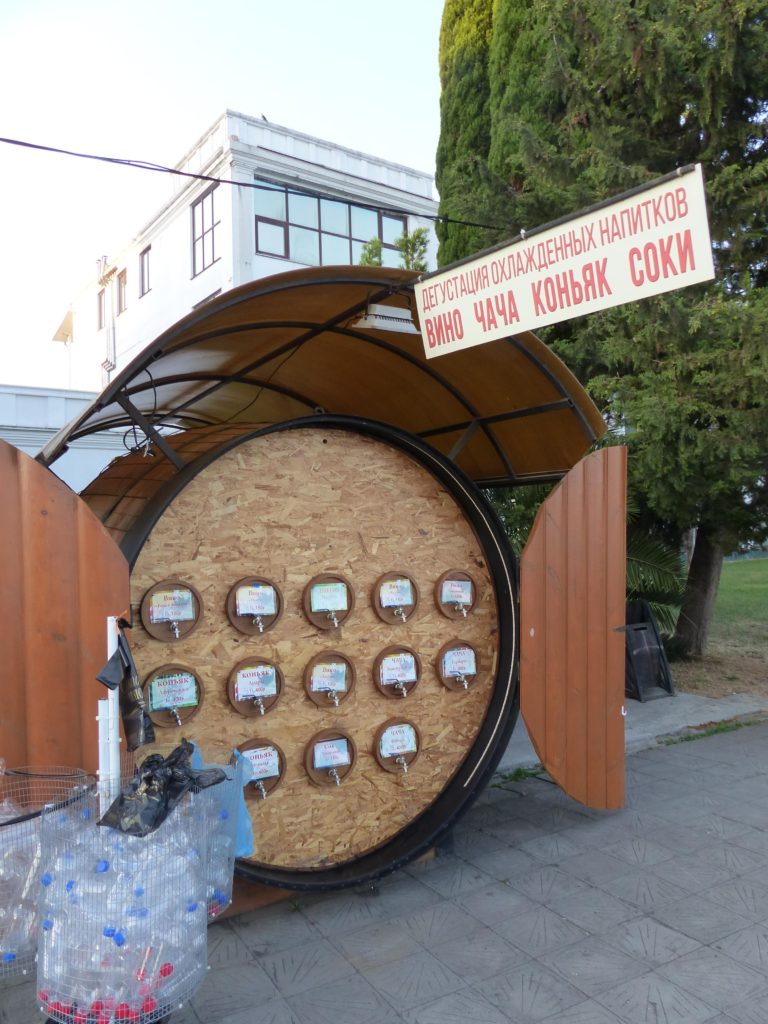
Although the parents probably shouldn’t be driving, the kids do: the street is busy until late at night with kids zipping around in hired Power-Wheels jeeps. For more aggressive kids there’s another option: little tanks, complete with swivelling guns on the front.

Your average every-day comrades weren’t the only ones who loved a holiday in Abkhazia: Josef Stalin himself had five dachas (summer homes) here, where he entertained everyone from party officials to mistresses. Famously paranoid, Stalin never revealed in advance which dacha he was headed for and all were constantly kept ready. We visited one of them near a small town called New Athos.
New Athos is an easy daytrip from Sukhumi, where in addition to Stalin’s dacha there’s a monastery with an impressive Orthodox cathedral.

But in case visitors are distracted by beaches and beautiful views, there is always a reminder of past conflict. Like a roadside memorial at the site of a significant battle or this monument of a bayonet in Sukhumi, dedicated to lives lost in the fighting.

The war is frozen in time, visible today in the shells of countless destroyed and abandoned buildings. These empty relics are more or less accessible to curious visitors who don’t mind climbing over the odd fence or through a twisted gate.
Some of the fiercest fighting took place in and around the Council of Ministries building in the centre of the capital.

Treading carefully – there’s broken glass; rusty metal rods hanging from ceilings; crumbling staircases; empty elevator shafts and questionable floors – the four of us climbed to the roof.




Watching the sunset over palm-filled green gardens from the roof of a bullet-riddled ruin is kind of surreal.

Abkhazia had plenty of train stations, also now defunct and overgrown:

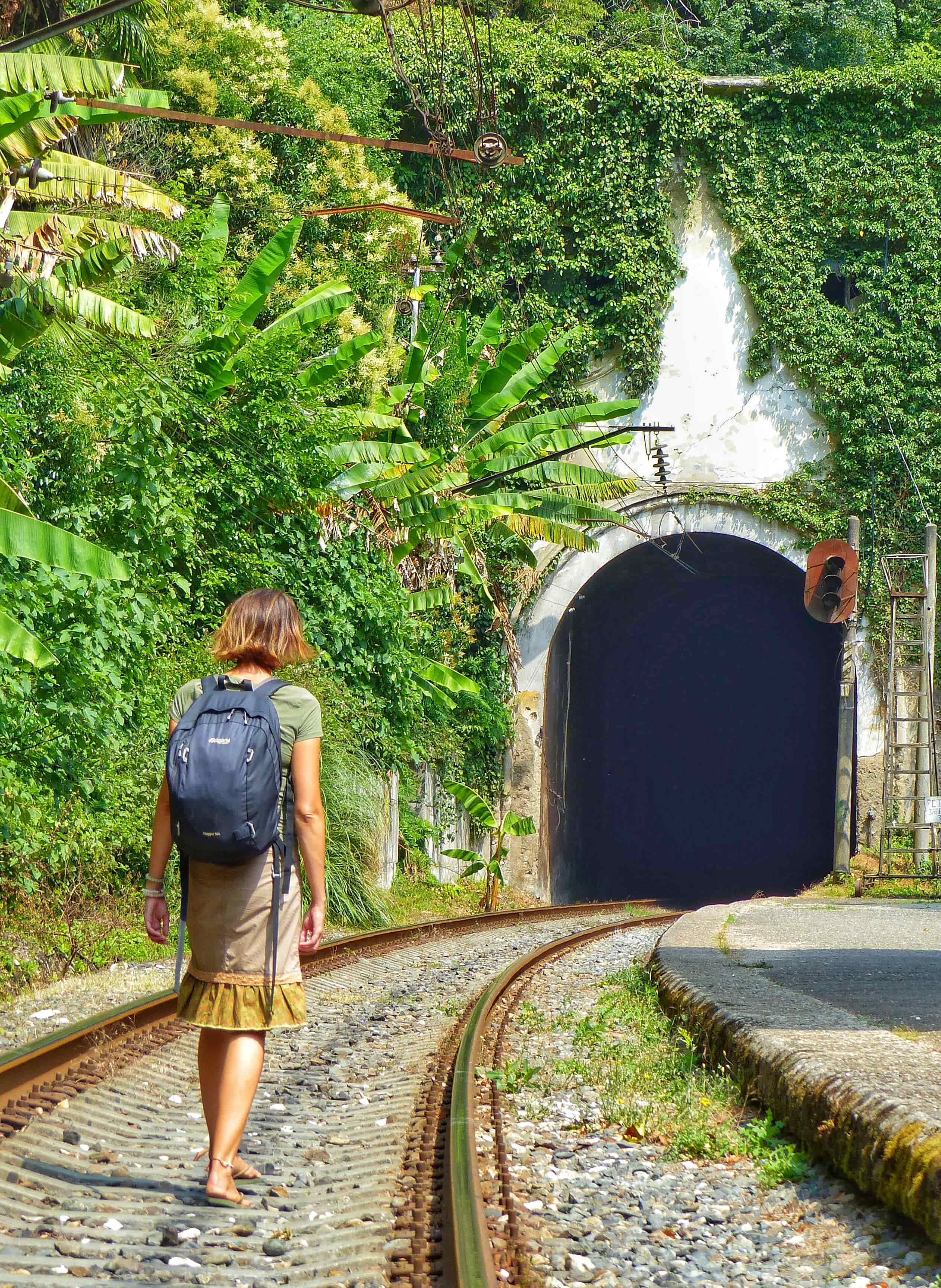
And life goes on, all around the ruins as if they weren’t even there. At this train station the passage under the platforms serves as a shortcut to the other side of the block.

Vendors sell inflatable unicorns and beach towels out front.

In some cases entire villages were abandoned, or nearly so. Tkvarcheli was once a prosperous soviet coal mining town but after a year under siege during the war the industry collapsed, the population plummeted, and it’s now little more than a desolate ghost town with a bombed-out power plant and quiet, depressive atmosphere.


Ben and I visited Tkvarcheli on the spur of the moment – Sherry and Matt had left Abkhazia the day before. We were on the bus to Gali heading to the border when we got off to explore.
But that area of Abkhazia isn’t very stable and our spontaneous change in plans ended with us being robbed in the forest by three men, followed by seven hours of questions from the local police who were distinctly unlike any police I have ever seen before.
Stranded, we spent the night at the home of a local family we’d met earlier in the day – when I called from the police station that night, Oleg drove an hour from his house at 11 pm to pick us up and bring us back.
The next morning Oleg and and his wife drove us all the way to Gali and saw us into a taxi to the border. We crossed back into Georgia and returned to Zugdidi feeling both relieved and very depressed. My time in Abkhazia was an interesting eye-opener, fun and unusual. I met some really bad people; but I also met some really good people.
Once a part of the Soviet Union but now just a forgotten corner of the world, this tiny state would be my 91st country – if it actually existed. Urban ruins standing still in time, against a backdrop of Black Sea beach resorts and beautiful nature – nothing much changes in a country that never was.
Read More
For more of my adventures (and misadventures) in Georgia, check out the rest of my stories from the road.
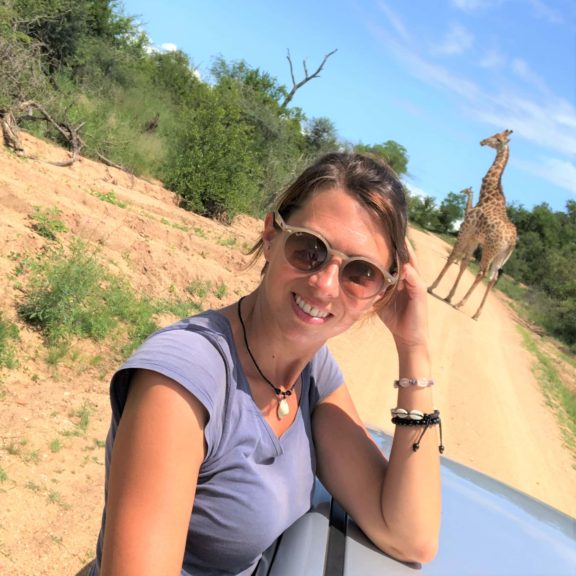
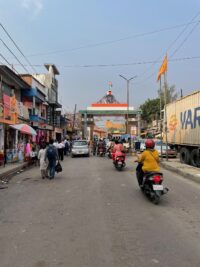
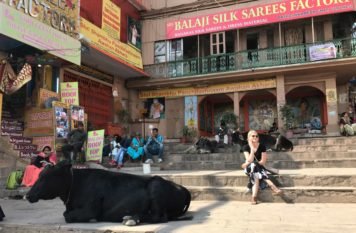
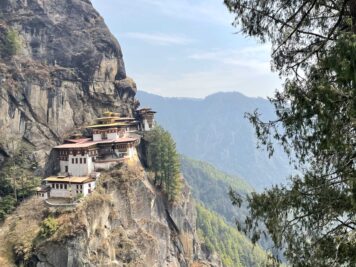
This Post Has 2 Comments
Wow, what an intriguing place. I’m sorry to hear you got robbed, but you sure did get to see some unique and interesting places most will never see. Such a shame for this place, the city looks quite nice as does the seaside. Thanks for sharing this part of the world with us.
Comments are closed.